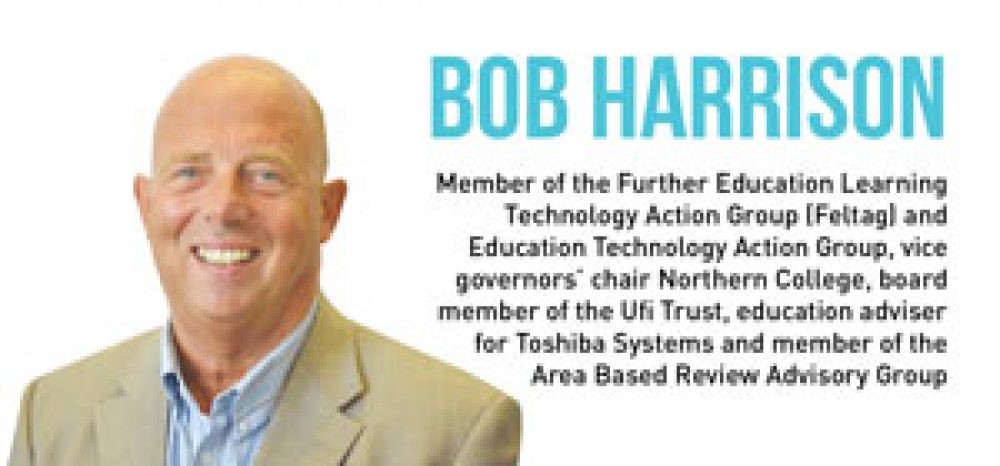
The Education Innovation conference and exhibition takes place in Manchester on Thursday and Friday. Here, speakers Bob Harrison and Pauline Odulinski give insights into their talks at which Skills Minister Matthew Hancock is expected to appear via videolink.
My grandchildren are six, four, three and one.
They are fortunate enough to have been born in England, with all the educational opportunities that this country expects and provides for its children. They will leave school between 2025 and 2029.
Having spent most of my career working in further, adult and vocational education and training I would like them to have the choice to attend a local FE college.
But will they want to and will there be a college in their community?
Unless we have a significant paradigm shift in the way we invest in, and utilise fully, digital technology I am worried the answers to the above questions will be no and no.
Some may think I am alarmist, but as I spend a lot of time in schools and with young people and have been heavily involved in the reform of the ICT curriculum in schools, am vice chair of governors at a college, as well as having read many horizon scanning reports as part of my Further Education Learning Technology Action Group (Feltag) work, I am concerned.
We need to develop some ‘paradigm pioneers’ who will challenge the current analogue mindset which permeates the culture of FE and skills policy and practice at all levels.
We have ‘institutional analoguism’ which threatens the very future of FE.
That is why the successful implementation of the Feltag recommendations is critical to the survival of the FE system in which I have spent most of my working life.
The Feltag report and recommendations are expected to be published by Skills Minister Matthew Hancock at the Education Innovation conference.
And my prediction for the education of my grandchildren is that they will leave school with no paper, no pens or pencils, no chalk or whiteboards.
They will have no hard copy text books, no libraries, no desks or desktop PCs and no written exams.
They will expect touch screen technologies, voice to text and text to voice software, learning analytics (not that they will know what they are), personalised learning, virtual and augmented reality, immediate formative feedback and on-screen summative assessments.
It is probable they will be wearing their computers and will expect to access learning whenever and wherever they want to learn and be assessed.
The relationship between the learner and the teacher will be fundamentally different to what it is today.
That is why the Feltag report recommendations are crucial to the future of FE.
The six workstreams which formed the focus of its work were horizon-scanning; investment and capital infrastructure; regulation and funding; workforce capacity; employers; and, learners.
These should form the platform for the recommendations to the minister.
Mr Hancock will then have the opportunity to respond either in ways the government can intervene directly or indicate where other agencies/bodies have a direct responsibility or in some cases where government needs to act to remove some of the obstacles which currently inhibit innovation.
Of course it is not just a case of government actions that are important and there are other players who are passionate about the role of technology enhanced learning in FE and skills.
The UfI charitable trust has recently agreed to fund a Vooc (Vocational open online course) for those working in vocational, further and adult education to help them increase their confidence and capability using digital technology and social media to improve access to and support of learning.
The trust is acting as a catalyst by funding several projects predicated on the findings of its Scaling Up report.
But if policy-makers, providers, funding agencies, governors, principals, employers, regulatory and assessment bodies, among surely others, take on board recommendations and implement them teachers will be allowed the space to creatively use digital technologies to enhance learning and assessment.
Then there is a chance my grandchildren will have the choice of a local FE provider.
Bob Harrison, vice chair of governors at Barnsley’s Northern College, a Feltag member and education adviser at Toshiba Information Systems (UK)
Bob Harrison’s talk, Findings of Feltag — The way forwards for FE and technology, is due to take place on day one of the conference at 1.10pm. It is expected to take place in the Blue Seminar Room, sponsored by FE Week, at 1.10pm with Professor Pauline Odulinski, OBE, due to take part in the subsequent panel debate on the Findings of Feltag and its Implications for FE. Mr Harrison is also expected to speak on day two, at 10.20am in the Green Seminar Room, on Whose curriculum is it anyway? A critical look at the development of the new national curriculum and the challenges that schools and teachers face. Bob Harrison’s talk, Findings of Feltag — The way forwards for FE and technology, is due to take place on day one of the conference at 1.10pm. It is expected to take place in the Blue Seminar Room, sponsored by FE Week, at 1.10pm with Professor Pauline Odulinski, OBE, due to take part in the subsequent panel debate on the Findings of Feltag and its Implications for FE. Mr Harrison is also expected to speak on day two, at 10.20am in the Green Seminar Room, on Whose curriculum is it anyway? A critical look at the development of the new national curriculum and the challenges that schools and teachers face.
Visit www.educationinnovation.co.uk for information on how to register for the conference for free









Your thoughts